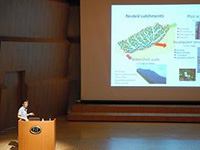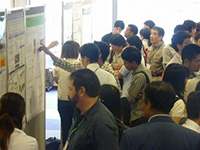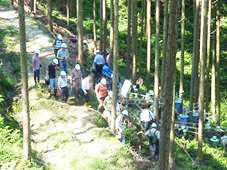
Keynote Lecture

Poster Session

Field Trip
The Third International Conference of Forest and Water in a Changing Environment (ForWat2012) was held in FIT Hall at Kyushu Institute of Technology from September 18 to 20, 2012. The conference was organized by the research group of the Development of Innovative Technologies for Increasing in Watershed Runoff and Improving River Environment by the Management Practice of Devastated Forest Plantation, represented by Professor Yuichi Onda, at the Graduate School of Life and Environment Sciences, University of Tsukuba. The research subject is one of the assignments of Innovative Technology and System for Sustainable Water Use, a CREST research area. The Executive Committee was jointly headed by Professor Kyouichi Ootsuki, one of the joint researchers with CREST, and Associate Professor Tamao Kasahara with the Faculty of Agriculture, Graduate School, Kyushu University and Kyushu University Forest. The conference, which was attended by 171 registered participants from 13 countries, had 10 keynote lectures, 54 oral presentations and 73 poster sessions. On the following day, September 21, after the conference was over, a field trip to a watershed test ground, which is a CREST research site at Iizuka, in Fukuoka Prefecture, was organized for approximately 50 participants. Blessed with clear skies after a typhoon, the conference came to a successful conclusion.
Climatic changes have been generating various chain reactions in eco-hydrological processes. Concern about such phenomena, accompanied by climatic changes, such as the degradation of forest watersheds, shortages of water resources and deterioration of ecosystems, have been increasing, calling for methodologies of forest water resource management. Guidelines for forest management and policy-making have been scientifically adjusted in view of climatic changes, but the guidelines have not been well organized. Research has nevertheless accumulated to prove the relationship between forest and water that enables us to make informed decisions. Accordingly this international conference, Forest and Water in Changing Environment, has been held every three years since its inauguration in Beijing, 2006, followed by the second conference in Raleigh, North Carolina, US. Its purpose is to promote a long-term international joint study on forest hydrology and water resources though the sharing of knowledge and experience by the assembly of global researchers specialized in the relevant fields, such as forest hydrology, ecological hydrology, watershed management, conservation ecology, forest ecology, and climate change science.
The third conference had six sessions for more active information sharing, discussion and academic exchange: Session A for water quality and carbon sequestration, Session B for ecological hydrological processes, Session C for forest and water in semi-arid and dry lands, Session D for exchange of water and CO2 between forest and atmosphere, Session E for conservation of water and soil at forest watersheds, and Session F for innovative technologies and systems for sustainable forests and water resources.
Day I was six public key lectures from six world-class researchers: Dr. W. Brutseer and Dr. J. Vose from the US, Dr. J. Kim from Korea, Dr. K. Bishop from Sweden, Dr. Y. Wang from China, and Dr. Yuichi Onda, who represented the CREST researchers, from Japan.
Day 2 was 31 oral presentations relevant to the A-D four sessions and 34 poster presentations while after lunch, two more open keynote lectures on climatology/meteorology were given by Dr. H. Diaz and Dr. T. Giambelluca, both from the US. After the scheduled sessions of the second day, sessions E and F were held and followed by three events for more discussions and exchanges among interested young volunteers.
Day 3 was 23 oral presentations related to the two E and F sessions and 38 poster presentations. Session F, which is directly related to the CREST research topics, invited Dr. H. Barnard and Dr. J. Stednick from the US, two researchers with international reputations on related research, who were joined by CREST researchers and other related researchers outside Japan for an animated discussion. After lunch, two watershed ecological hydrology topics were presented as open keynote lectures by Dr. L. Zhang from Australia and Dr. Futoshi Nakamura from Japan. The closing session was a briefing from the chairpersons of the six sessions about the kinds of discussions that took place as well as discussions about their future vision. Participants decided that the fourth conference would be held in British Columbia, Canada, for more information and academic exchanges.
On the following day, September 21, a field trip to a CREST research site, the Iizuka Experimental Watershed in Fukuoka Prefecture, took place. Local students made on-site presentations with posters at three major observation points for effluence, evaporation and transpiration. The presentation led to very enthusiastic on the spot questions-and-answers, information exchanges and discussion by all attendees. The participants, both from Japan and other parts of the world, were all impressed to see the field right after 50℅ intensive forest thinning had been carried out in Japan’s major conifer plantation with sugi cedar and hinoki cypress trees. They were also impressed by observing the on the spot ongoing practice of comprehensive ecological hydrology. These findings led to their belief that this kind of field trip in the future should be continued because such an effect cannot be produced by desk-bound discussions alone.
After this conference, the expectation is that core participants would contribute the information from the presentations at the conference to academic journals. Core participants are also expected to launch a preparatory committee for closer and more effective international collaboration at the fourth international conference on forest hydrology and water resources.
CREST
http://www.jst.go.jp/kisoken/crest/research_area/index.html
JST, an integrated organization of science and technology in Japan, establishes an infrastructure for the entire process from the creation of knowledge to the return to the society. For more information, visit http://www.jst.go.jp/EN/